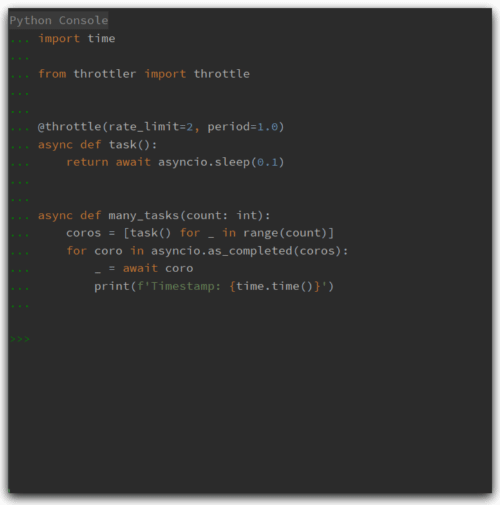Project: throttler
Zero-dependency Python package for easy throttling with asyncio support
Project Details
- Latest version
- 1.2.2
- Home Page
- https://github.com/uburuntu/throttler
- PyPI Page
- https://pypi.org/project/throttler/
Project Popularity
- PageRank
- 0.0016183352259274743
- Number of downloads
- 93591
Throttler
Zero-dependency Python package for easy throttling with asyncio support.
📝 Table of Contents
- 🎒 Install
- 🛠 Usage Examples
- 👨🏻💻 Author
- 💬 Contributing
- 📝 License
🎒 Install
Just
pip install throttler
🛠 Usage Examples
All run-ready examples are here.
Throttler and ThrottlerSimultaneous
Throttler:
Context manager for limiting rate of accessing to context block.
from throttler import Throttler
# Limit to three calls per second
t = Throttler(rate_limit=3, period=1.0)
async with t:
pass
Or
import asyncio
from throttler import throttle
# Limit to three calls per second
@throttle(rate_limit=3, period=1.0)
async def task():
return await asyncio.sleep(0.1)
ThrottlerSimultaneous:
Context manager for limiting simultaneous count of accessing to context block.
from throttler import ThrottlerSimultaneous
# Limit to five simultaneous calls
t = ThrottlerSimultaneous(count=5)
async with t:
pass
Or
import asyncio
from throttler import throttle_simultaneous
# Limit to five simultaneous calls
@throttle_simultaneous(count=5)
async def task():
return await asyncio.sleep(0.1)
Simple Example
import asyncio
import time
from throttler import throttle
# Limit to two calls per second
@throttle(rate_limit=2, period=1.0)
async def task():
return await asyncio.sleep(0.1)
async def many_tasks(count: int):
coros = [task() for _ in range(count)]
for coro in asyncio.as_completed(coros):
_ = await coro
print(f'Timestamp: {time.time()}')
asyncio.run(many_tasks(10))
Result output:
Timestamp: 1585183394.8141203
Timestamp: 1585183394.8141203
Timestamp: 1585183395.830335
Timestamp: 1585183395.830335
Timestamp: 1585183396.8460555
Timestamp: 1585183396.8460555
...
API Example
import asyncio
import time
import aiohttp
from throttler import Throttler, ThrottlerSimultaneous
class SomeAPI:
api_url = 'https://example.com'
def __init__(self, throttler):
self.throttler = throttler
async def request(self, session: aiohttp.ClientSession):
async with self.throttler:
async with session.get(self.api_url) as resp:
return resp
async def many_requests(self, count: int):
async with aiohttp.ClientSession() as session:
coros = [self.request(session) for _ in range(count)]
for coro in asyncio.as_completed(coros):
response = await coro
print(f'{int(time.time())} | Result: {response.status}')
async def run():
# Throttler can be of any type
t = ThrottlerSimultaneous(count=5) # Five simultaneous requests
t = Throttler(rate_limit=10, period=3.0) # Ten requests in three seconds
api = SomeAPI(t)
await api.many_requests(100)
asyncio.run(run())
Result output:
1585182908 | Result: 200
1585182908 | Result: 200
1585182908 | Result: 200
1585182909 | Result: 200
1585182909 | Result: 200
1585182909 | Result: 200
1585182910 | Result: 200
1585182910 | Result: 200
1585182910 | Result: 200
...
ExecutionTimer
Context manager for time limiting of accessing to context block. Simply sleep
periodsecs before next accessing, not analog ofThrottler. Also it can align to start of minutes.
import time
from throttler import ExecutionTimer
et = ExecutionTimer(60, align_sleep=True)
while True:
with et:
print(time.asctime(), '|', time.time())
Or
import time
from throttler import execution_timer
@execution_timer(60, align_sleep=True)
def f():
print(time.asctime(), '|', time.time())
while True:
f()
Result output:
Thu Mar 26 00:56:17 2020 | 1585173377.1203406
Thu Mar 26 00:57:00 2020 | 1585173420.0006166
Thu Mar 26 00:58:00 2020 | 1585173480.002517
Thu Mar 26 00:59:00 2020 | 1585173540.001494
Timer
Context manager for pretty printing start, end, elapsed and average times.
import random
import time
from throttler import Timer
timer = Timer('My Timer', verbose=True)
for _ in range(3):
with timer:
time.sleep(random.random())
Or
import random
import time
from throttler import timer
@timer('My Timer', verbose=True)
def f():
time.sleep(random.random())
for _ in range(3):
f()
Result output:
#1 | My Timer | begin: 2020-03-26 01:46:07.648661
#1 | My Timer | end: 2020-03-26 01:46:08.382135, elapsed: 0.73 sec, average: 0.73 sec
#2 | My Timer | begin: 2020-03-26 01:46:08.382135
#2 | My Timer | end: 2020-03-26 01:46:08.599919, elapsed: 0.22 sec, average: 0.48 sec
#3 | My Timer | begin: 2020-03-26 01:46:08.599919
#3 | My Timer | end: 2020-03-26 01:46:09.083370, elapsed: 0.48 sec, average: 0.48 sec
👨🏻💻 Author
Ramzan Bekbulatov:
💬 Contributing
Contributions, issues and feature requests are welcome!
📝 License
This project is MIT licensed.



